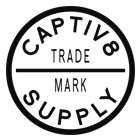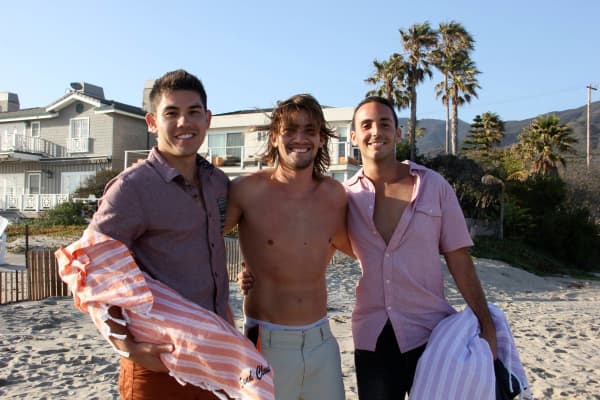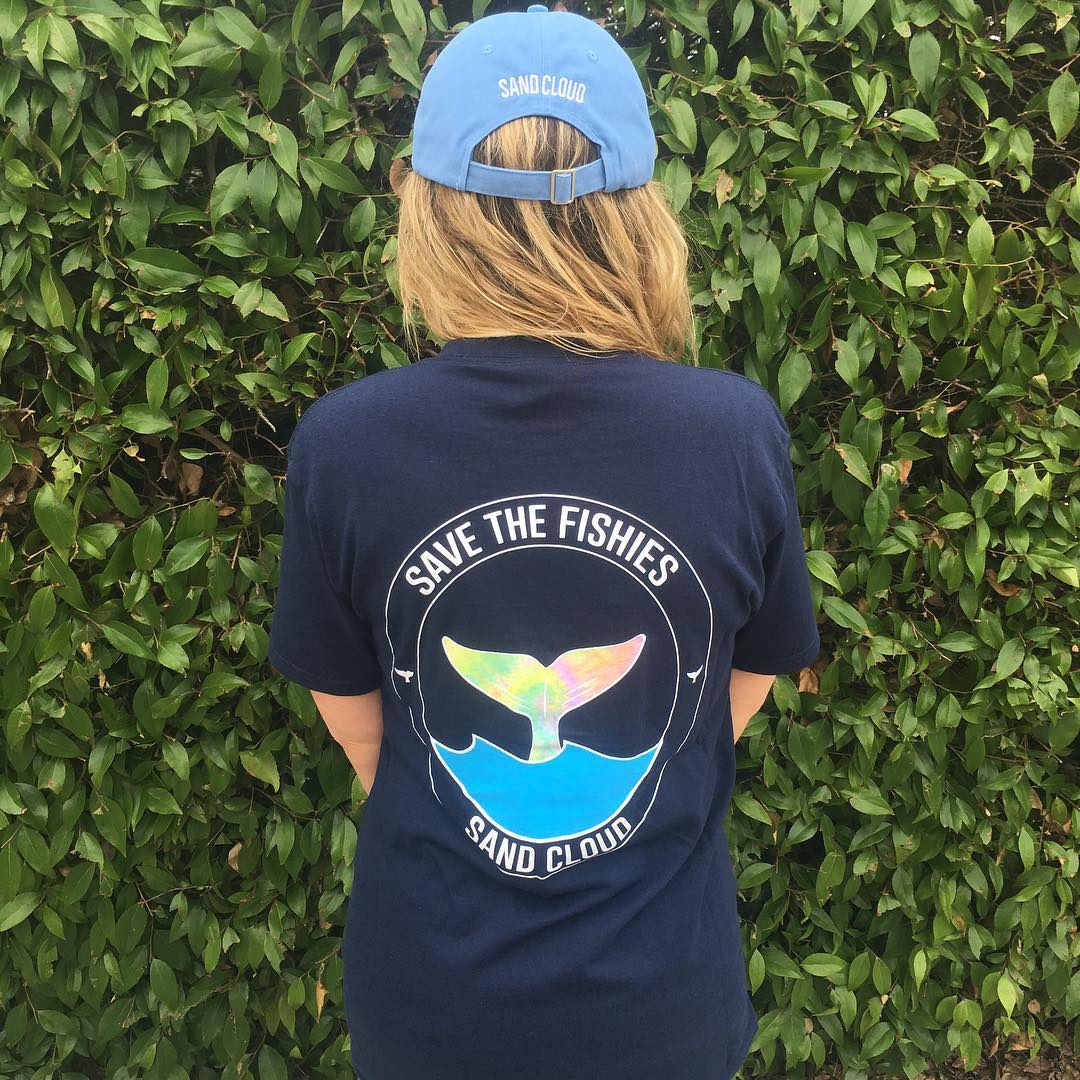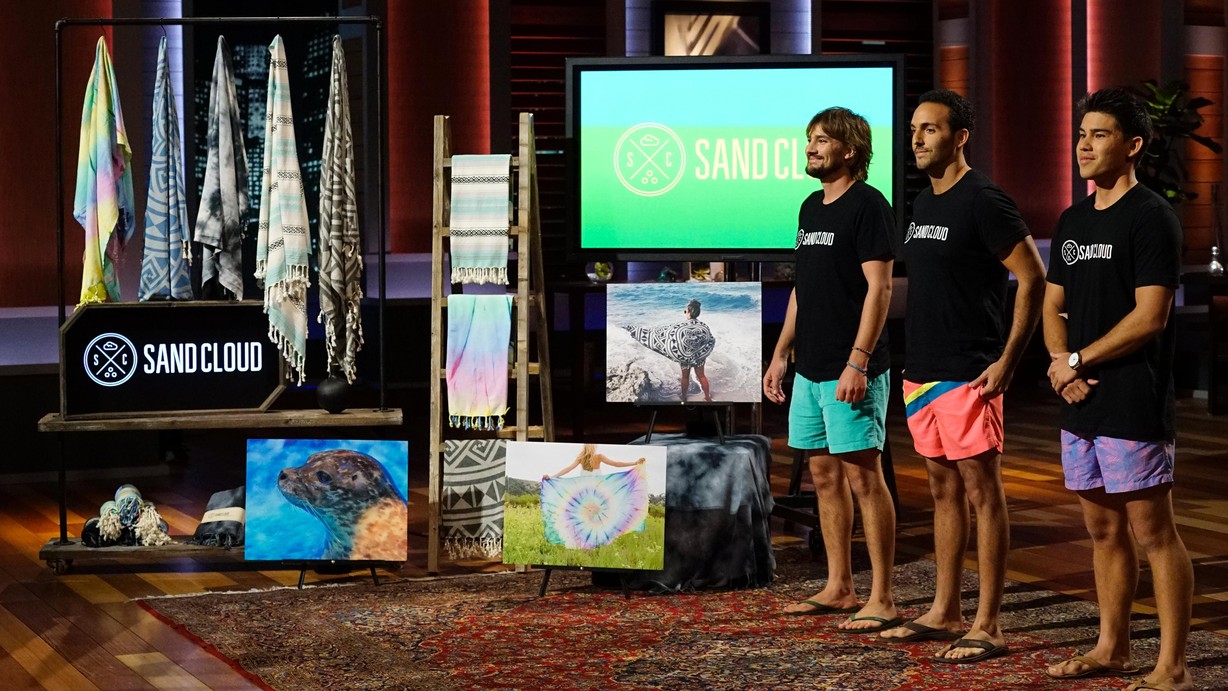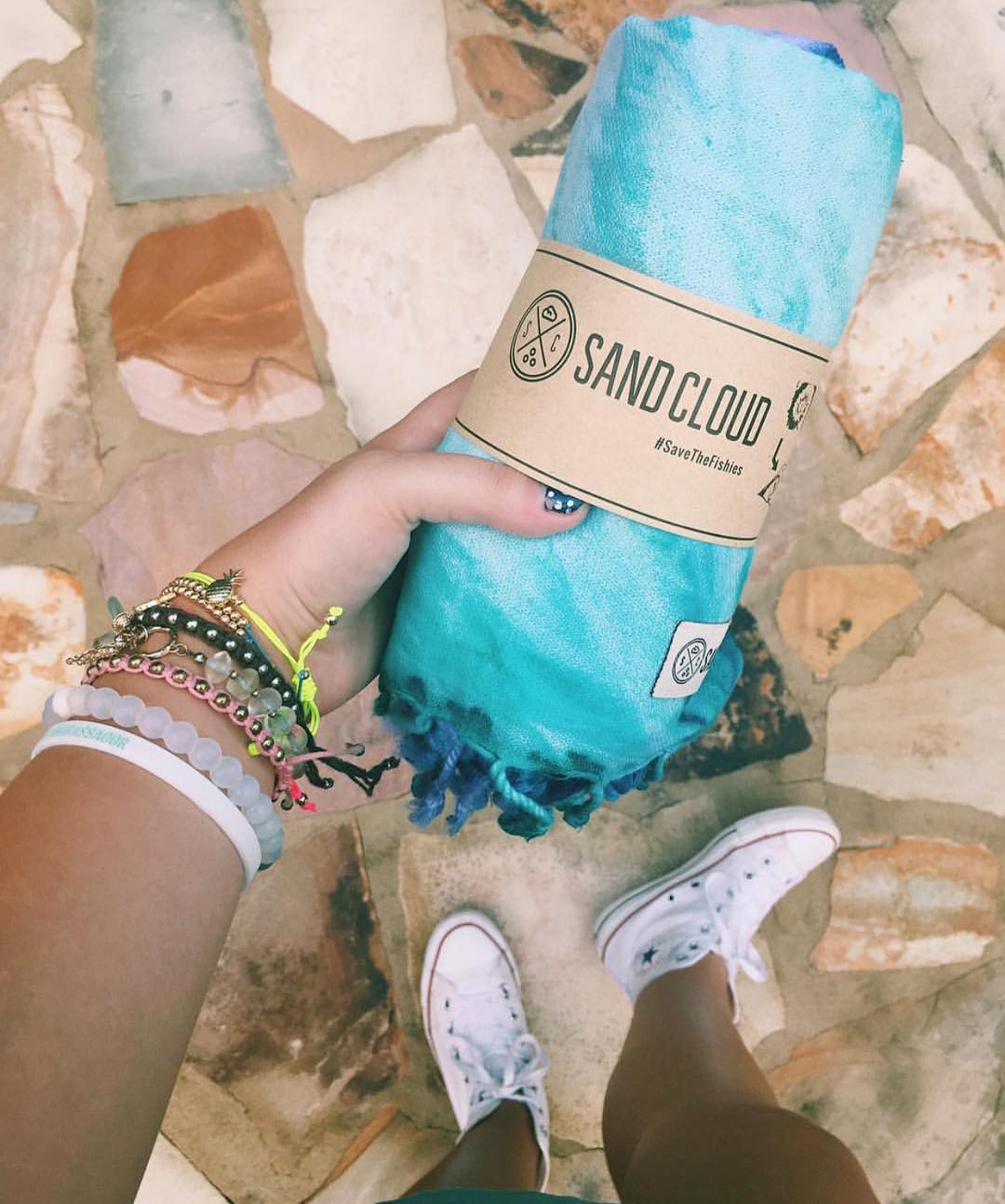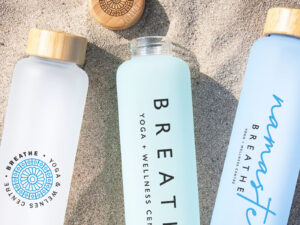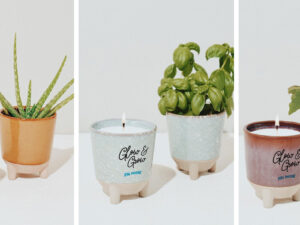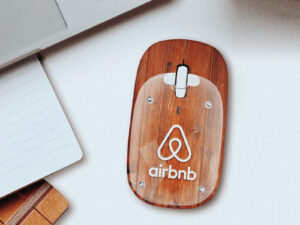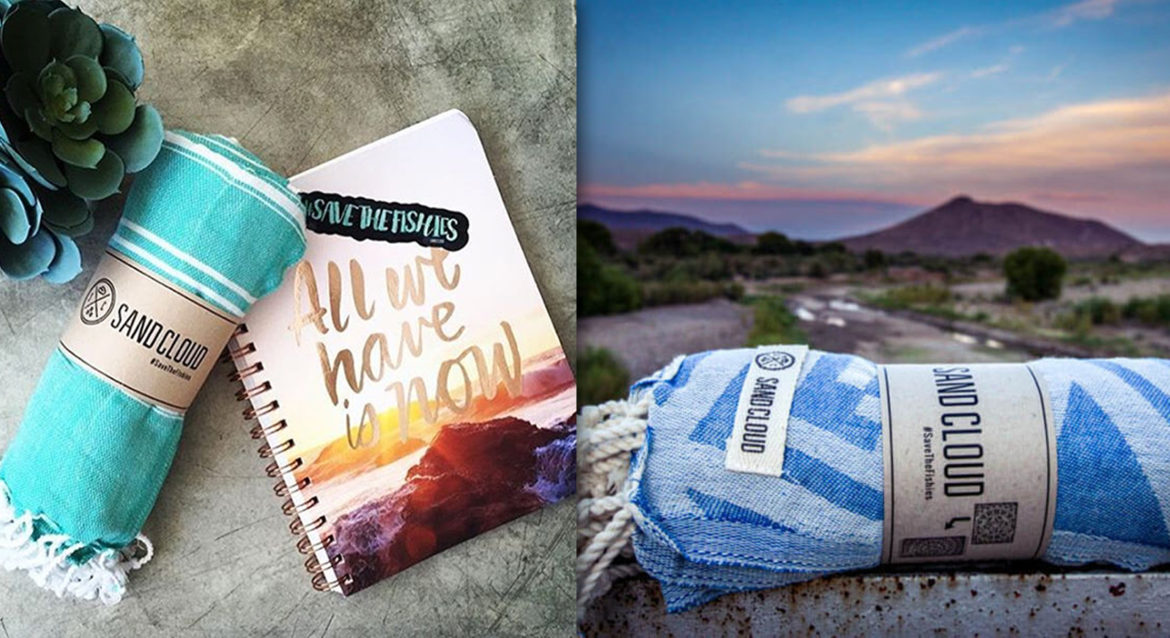
CNBC: “In 2013, Bruno Aschidamini, Steven Ford and Brandon Leibel were selling life insurance from a call center in San Diego.
“It was pretty bad. Half the calls were like, ‘Take me off the call list,'” says Aschidamini.
The friends had a dream to quit their corporate jobs and build lives where they were in charge. So they did. Today, they are running a beach-towel business, Sand Cloud, that is projecting $7 million in annual revenue in 2017.
From the life insurance call-center to Cloud Nine
Ford and Leibel, both 26, met as college roommates at San Diego State University. After graduation, they took the first jobs they could find that would allow them to stay in the area. That’s where they met Aschidamini, 31 — at the life insurance call center.
Living in California had given Ford and Leibel an idea for a business: a towel that would help people take better naps on the beach. So the friends ordered a few dozen beach towels and travel pillows from a discount website and had a local seamstress sew the pillows to the towels. They called their product Cloud Nine. Aschidamini bought the first one for $20.
By April 2014, Leibel and Aschidamini quit their jobs at the call center. Leibel spent his time teaching himself how to play the guitar from YouTube videos and driving an Uber to pay the bills. Aschidamini had gone to Thailand for a couple months to detox from corporate-cubical life, then started a one-man life insurance brokerage from his living room in San Diego.
During a game of catch on the beach, Aschidamini brought up Cloud Nine. Leibel didn’t want to talk about the failure — until Aschidamini said he had a better name for the product: Sand Cloud. Inspired anew, the three friends created a business plan that night.
“The level of energy and excitement, we were all completely on board,” says Ford. So much so that he finally quit the call center, too.
“Looking back now, it was crazy how much risk we took because all we had was a name, we had nothing else,” says Aschidamini. “We had a vision. That was like the biggest thing we had.” They were going to build a towels-with-pillows-attached empire.
Driving Ubers and eating rice and beans
Committed to building Sand Cloud together, the friends started by getting ultra frugal. Aschidamini gave up his lease and the three moved into a two bedroom with a loft.
“We are making rice and beans every single day trying to live as cheaply as possible,” says Ford, who had joined Leibel as Uber driver to bring in some money.
Aschidamini, the best with technical business paperwork, worked from their home to set up trademarks, the legal framework for the business and other logistics of starting up, like sourcing the towels.
“As we are doing all of this, we are not seeing any success,” says Aschidamini. “We are giving away product we are not making any money, but the one thing we are seeing — which is our version of success — is our followers are just jumping up really fast on social media. We are gaining a few hundred followers a day and … in our eyes that’s huge.
“In our parents’ eyes, who just gave us money, they were very disappointed with us.”
The towel in the corner and a $20,000 break
In January 2015, Sand Cloud went to the Surf Expo trade show in Orlando, Fla., to try and sell the pillow-towel to wholesale retailers. But instead, everyone kept asking about a towel decorated with a mandala they had absent mindedly tucked away in the corner of the booth. The three co-founders had ordered the mandala towel from their manufacturer as a sample but hadn’t attached a pillow.
A buyer from the surf and snowboard brand Quicksilver placed an order for $20,000 worth of the pillow-free mandala towels.
With such a large order, the Sand Cloud team decided they should add it to their regular offering online. Over the next year, sales of decorated beach towels surged, while sales of the pillow-towels driveled into insignificance.
“It was the idea that started everything and we had emotional attachment to it,” says Leibel of the pillow-towel. “We didn’t want to admit that it had to go, but eventually we came to our senses and we realized that for business and for growth we had to get rid of it.”
In 2015, thanks to the addition of the pillow-less beach towels (which sell for between $44 and $99 each), Sand Cloud did $430,000 in sales. Ford and Leibel finally stopped driving for Uber at the end of that year so all three could focus 100 percent on the business.
The three co-founders shipped the first half million dollars worth of inventory out of their two-bedroom apartment before they moved to an office warehouse space in San Diego in February 2016. They rented a 2000-square-foot, nearly move-in ready office in San Diego for a couple grand a month, says Leibel.
Sand Cloud’s momentum accelerated at an impressive and steady rate. They added accessories, water bottles and jewelry to its product line-up. In 2016 the company did $2.4 million in sales.
They were also donating a percentage of profits to marine conservation organizations — a mission that was always part of vision.
“The marine life, the charity aspect made people keep following us and made people support us,” says Leibel. The company now donates 10 percent of profits. “That breeds loyalty — having a mission behind your brand is what makes people loyal.”
Into the ‘Tank’ and beyond
The co-founders still had another milestone to conquer.
For years, Leibel had been applying to be on ABC’s hit entrepreneur show “Shark Tank.” Finally, in 2016, the Sand Cloud application was accepted. “I wanted to be on ‘Shark Tank’ before we even quit our jobs,” says Leibel. “I was obsessed with ‘Shark Tank.'”
The co-founders took their appearance on the show very seriously. They watched every single episode, read all the judges’ books and devoured any interview with the Sharks that they could find.
It paid off. Their pitch on the show won them an investment from Robert Herjavec. (The episode aired in Feb. 2017 with a $200,000 investment in exchange for 15 percent of the business.) The three friends used the money to improve the company’s website and buy inventory they desperately needed to fuel growth.
In part, it was the company’s social giveback that won Herjavec over. “I firmly believe you have to have purpose and these three have it in spades,” says Herjavec to CNBC about his investment in Sand Cloud. “I’m really proud of their success so far and know they’re going to continue to learn and grow this company.”
Appearing on the show was an immediate benefit for Sand Cloud. The night the show aired, 13,000 people bombarded the website at once. Previously, the high had been about 600.
In 2017, with Herjavec on their team, the Sand Cloud co-founders expect to do $7 million in sales. Their goal is to donate $1 million to marine life non-profits.
Looking back to where they started, the co-founders say they didn’t know how hard the path would be when they first had the idea for the pillow-towel. “We were so inexperienced at the time, we thought we are just going to put up a website and become millionaires” says Leibel.
It was a harder journey than they expected, but they were were unshakeable in their determination. “The blind faith that we had to pursue freedom and become an entrepreneur — we never questioned it once,” says Aschidamini.
